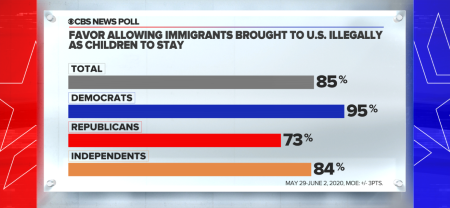|
As the U.S. Supreme Court prepares to decide on the Trump administration’s attempt to end Deferred Action for Childhood Arrivals (DACA), a CBS News poll finds bipartisan support for DACA recipients, report Jennifer De Pinto and Anthony Salvanto at CBS News. “Support for DACA extends across party lines and demographic groups: a large majority of Republicans, as well as almost all Democrats, favor allowing immigrants brought into the U.S. illegally as children to stay.”

A decision is likely to come this month, and will place the fate of hundreds of thousands of people in the middle of deeply polarizing election.
Welcome to Tuesday’s edition of Noorani’s Notes. Have a story you’d like us to include? Email me at [email protected].
NOVEMBER STRATEGY – How do you win reelection amid an economic downturn, widespread protests, a pandemic, and lagging poll numbers? “President Donald Trump and his top aides are planning to rev up their campaign machine in the coming days with an aggressive focus on voters’ perceived fears about crime, China and immigration — invoking parts of their successful 2016 strategy as they try to regain ground lost in recent months,” Nancy Cook writes for Politico. Remember, in addition to possibly getting the green light to wind down DACA, the administration may also extend and expand the April 22 proclamation suspending certain types of immigration.
ASIAN AMERICANS ON THE FRONTLINES – According to a report from New American Economy, two-thirds of Asian American health and food workers in essential roles during COVID-19 are immigrants, reports Agnes Constante for NBC News. “The report noted that in health care, AAPIs [Asian Americans and Pacific Islanders] account for more than 20 percent of physicians and surgeons, about 14 percent of whom are immigrants. And 1 in 11 nurses are AAPI, about 75 percent of whom are immigrants. AAPIs also support the country’s food supply chain by working in farms, food processing factories, grocery stores and restaurants.” What’s more, as Andrew Lim, director of quantitative research at New American Economy, put it: “It’s not just about these high prestigious jobs. It’s also very much about the people who keep entire industries running. It’s the day-to-day people and the people who are putting their lives out there at risk.”
SECTION 212 (F) – President Trump has repeatedly used an obscure authority — section 212(f) of the Immigration and Nationality Act — to impose restrictions on various categories of immigrants, Stuart Anderson highlights in an interview with law professor Ilya Somin for Forbes. 212(f) gives the president the power to bar entry to any foreign national deemed “detrimental” to the interests of the U.S. In the future, Congress could replace 212(f) “with more limited authority allowing the president to bar entry only for specified reasons, such as a threat to national security or participation in organized crime or the like. When the president uses the authority to exclude they could also require the executive to provide substantial evidence indicating that the persons in question really do pose a threat of the sort specified in the revised statute.” In addition, Somin notes, Congress could direct courts to require the administration to prove, with more evidence, the rationale for invoking for 212(f), and impose a sunset clause.
FARM WORKER SHORTAGES AND SOLUTIONS – A lot has changed during COVID-19, but one thing has remained constant: “we still need to put food on the table for our families, and we rely on millions of immigrant workers to do that,” writes Paul DiMare, president and CEO of DiMare Fresh and co-chair of the American Business Immigration Coalition, in an op-ed for The Hill. Even with high unemployment, we currently face a shortage of farm workers. The good news: “A policy solution does exist. In fact, it’s already sitting in the Senate. The Farm Workforce Modernization Act, which passed the House of Representatives with strong bipartisan support last fall, provides a pathway to legal status for the undocumented workers who are the backbone of our food supply chain and makes much-needed improvements to the H-2A Temporary Agricultural Workers Program.” Read our summary of the bill here.
POLICE ENCOUNTERS – In an interview with CNN’s Catherine E. Shoichet, Mukhtar Ibrahim, founder of the Sahan Journal in Minnesota, says concerns about police treatment extend to Minnesota’s large Somali community. “The Somalis are also black and they've been disproportionately affected by the police activities. … We talked to a lot of people who say they are afraid of the police. When they see a police officer, they tense up. And those experiences show the lack of trust between the black community and the police. And it doesn't matter whether you are a new immigrant or whether you were born here or whether your parents fled from civil war, it’s almost the same experience as the African American community.”
Thanks for reading,
Ali
|